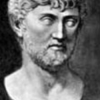Lucretius

Lucretius
Titus Lucretius Caruswas a Roman poet and philosopher. His only known work is the epic philosophical poem De rerum natura about the tenets and philosophy of Epicureanism, and which is usually translated into English as On the Nature of Things...
NationalityRoman
ProfessionPoet
space profound goes-on
But since I've taught that bodies of matter, made Completely solid, hither and thither fly Forevermore unconquered through all time, Now come, and whether to the sum of them There be a limit or be none, for thee Let us unfold; likewise what has been found To be the wide inane, or room, or space Wherein all things soever do go on, Let us examine if it finite be All and entire, or reach unmeasured round And downward an illimitable profound.
hands space giving
Thus the sum Forever is replenished, and we live As mortals by eternal give and take. The nations wax, the nations wane away; In a brief space the generations pass, And like to runners hand the lamp of life One unto other.
space grandparent torches
In a brief space the generations of beings are changed, and, like runners, pass on the torches of life.
space generations literature
Thus the sum of things is ever being reviewed, and mortals dependent one upon another. Some nations increase, others diminish, and in a short space the generations of living creatures are changed and like runners pass on the torch of life.
space people atheism
...if one thing frightens people, it is that so much happens, on earth and out in space, the reasons for which seem somehow to escape them, and they fill in the gap by putting it down to the gods.
bitter food
What is food to one is to another bitter poison.
food man
What is food to one man is bitter poison to others.
stones doe heavy
If God can do anything he can make a stone so heavy that even he can't lift it. Then there is something God cannot do, he cannot lift the stone. Therefore God does not exist.
drops falling hole rain violence
The drops of rain make a hole in the stone, not by violence, but by often falling
lying mind atheism
True piety lies rather in the power to contemplate the universe with a quiet mind.
fortune morrow doubtful
It is doubtful what fortune to-morrow will bring. [Lat., Posteraque in dubio est fortunam quam vehat aetas.]
light wind white
The gods and their tranquil abodes appear, which no winds disturb, nor clouds bedew with showers, nor does the white snow, hardened by frost, annoy them; the heaven, always pure, is without clouds, and smiles with pleasant light diffused. [Lat., Apparet divom numen, sedesque quietae; Quas neque concutiunt ventei, nec nubila nimbeis. Aspergunt, neque nex acri concreta pruina Cana cadens violat; semper sine nubibus aether Integer, et large diffuso lumine ridet.]
law fixed all-things
All things obey fixed laws.
men understanding mind
How wretched are the minds of men, and how blind their understandings. [Lat., O miseras hominum menteis! oh, pectora caeca!]